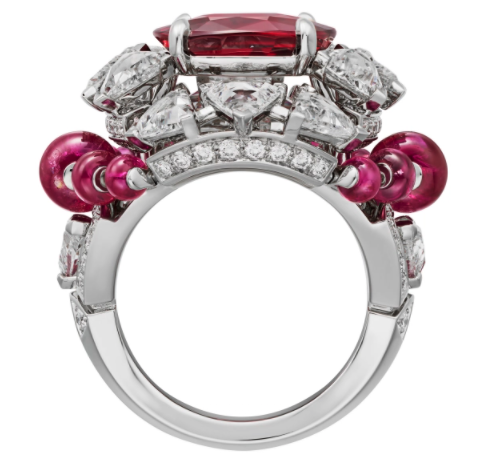Richemont’s Q1 Sales Jumped 22% Ahead of 2019

- Oops!Something went wrong.Please try again later.
Hot off a stronger-than-expected first quarter, Compagnie Financière Richemont is rejiggering its governance in a quest for greater agility, consumer focus and digital innovation.
On Friday, the Swiss luxury group said several of its top brand executives would relinquish their roles on the senior executive committee and board of directors.
More from WWD
“The outstanding development of Cartier and Van Cleef & Arpels, in particular, means that these businesses have reached a size and scale that require the full attention of their leaders and support of the group to continue on their remarkable trajectory,” Richemont chairman Johann Rupert said in a statement as part of a trading update. “The time is ripe for a more streamlined structure as we embark on the next stage of our development.
“These governance changes will allow Maison and business executives to focus exclusively on their customers, colleagues, partners and the sustainable development of their entities at a time when the world is changing rapidly and growing in complexity,” he added.
Cyrille Vigneron, president and chief executive officer of Cartier, and Nicolas Bos, president and CEO of Van Cleef & Arpels, are to step down from the senior executive committee and will not seek reelection to the board of directors at the group’s annual general meeting on Sept. 8. They continue to report directly to Rupert.
Philippe Fortunato, CEO of fashion and accessories; Emmanuel Perrin, head of specialist watchmakers distribution, and Frank Vivier, chief transformation officer are also to step down from the senior executive committee. The three men continue to report to group CEO Jérôme Lambert.
Rupert, Lambert and Burkhart Grund, chief finance officer, are to remain on the senior executive committee and stand for reelection to the board of directors at the AGM.
Richemont’s star jewelry brands fueled a strong performance in the three months ended June 30.
The Swiss luxury group trumpeted 43 percent growth at its jewelry maisons, headlined by strong jewelry and watch sales at Cartier and Van Cleef & Arpels. Revenues came to 2.52 billion euros in the three months ended June 30.

“A stronger and more commercial product lineup at Cartier with better execution, ongoing Van Cleef strength and longer-term growth prospects for Buccellati underpin the earnings and (free cash flow) engine within Richemont,” Piral Dadhania, a luxury analyst at RBC, said in a research note on Friday.
By comparison, sales at Richemont’s specialist watchmakers — which include A. Lange & Söhne, Baume & Mercier, IWC Schaffhausen, Jaeger-LeCoultre, Panerai and Vacheron Constantin — grew by 6 percent to 849 million euros.
Other business, which include the fashion and accessories houses Alaïa, AZ Factory, Chloé, Dunhill, Montblanc and Peter Millar, declined 7 percent to 440 million euros, with Richemont blaming “challenges in the wholesale channel, particularly in travel retail.”
Underscoring the resilience of the luxury sector, and signaling pent-up demand after coronavirus-related restrictions, Richemont saw revenues bound 22 percent ahead of pre-pandemic levels the first quarter to reach 4.4 billion euros.
The gains were driven by brisk business in the Americas — up 47 percent versus 2019 — and Asia Pacific, up 40 percent and with “good momentum” in mainland China, Macau and South Korea.
Europe and Japan were the laggards. In Europe, sales contracted 15 percent in the three months as “robust demand from local clientele could not offset the halt in tourist sales.”
Meanwhile, Japan sales slipped 14 percent due to “renewed public health protection measures” and a dearth of tourists.
Revenues in the Middle East and Africa zoomed ahead 55 percent, boosted by domestic and tourist spending in Dubai and Saudi Arabia.
Compared to the first quarter of 2020, group sales at Richemont rocketed 129 percent at constant exchange rates and 121 percent at actual exchange rates. Sales in the Americas catapulted 247 percent thanks to lusty local demand.
According to RBC’s calculations, the results came in 10 percent above consensus. Richemont also flagged “strong sequential improvement” compared to the quarter ended March 31.
By channel, retail sales were up 35 percent versus 2019 and particularly strong in the U.S., Russia and Saudi Arabia, according to Richemont.
Online sales rose 29 percent, while the wholesale channel eased 3 percent. Offline retail sales represented 73 percent of group tallies in first quarter.
The group’s net cash position stood at 3.6 billion euros as of June 30.
SEE ALSO:
Richemont Grows Leather Goods With Delvaux Purchase
Johann Rupert Has No Plans to Sell Richemont, Which Bounced Back in Q4
Rupert’s Dream Realized: An All-Embracing Platform for Digital Luxury
Sign up for WWD's Newsletter. For the latest news, follow us on Twitter, Facebook, and Instagram.

